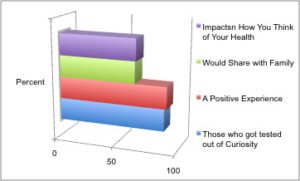
Earlier this month Public Health Genomics published a paper by a team of Swiss researchers that reinforces the growing body of work showing both a strong consumer interest in DNA testing, and positive experiences with personal genetic testing.
In this study, the participants were life science students at the University of Zurich who purchased the kits from 23andMe at an educational discount. While these participants had more genetic expertise than the average consumer, their responses were not very different from people in other recent studies.
Many of the respondents described their experience as “fun” and said part of their motivation for getting genotyped was to advance genetic research.
“Their experiences provide valuable insights into the role of personal curiosity and altruism (fostering medical research) as motivations for testing and the utility attributed to both,” the study concludes.
DNA Testing Does Not Induce Anxiety
Ninety percent of them described their experience as positive, and a majority indicated the test would impact how they thought about their health.
the study also appears to add more evidence that direct to consumer testing doesn’t induce fear. Although a little more than half the respondents had some concerns about confidentiality and privacy, only one described those as “serious concerns.”
We’ve written several times about other studies that show people don’t freak out about what they learn from their genetic information. People also say they find value in getting genotyped.
Motivations for DNA Testing
This study – the first to look at direct to consumer genetic testing in Europe – shows much the same as previous studies done in the United States. But unlike most of the other studies, it also delves into both why people get genotyped and how they look at that information.

In another recent study presented at the annual meeting of the American Society of Human Genetics in San Francisco, Sandra Lee, Ph.D., a Senior Research Scholar at the Stanford Center for Biomedical Ethics, presented findings from a study on 23andMe customers. Most of those in her study freely shared their genetic data with family and friends. Many of them also posted their results on Facebook. This was also the case in the Swiss study, in which about 64 percent of those asked said they’d share their results with family.
Another finding from the Swiss study was that consumers were motivated not just by curiosity but a desire to participate in research in some way.
“23andMe gave them an opportunity they otherwise would not have had to help advance research,” the paper said. “Individual contributions to research were discussed in terms of ‘investments’ in the future. (The) returns being the acceleration of medical discovery and better medicine.”